The 52nd Session of the Human Rights Council
27 February – 4 April 2023
Agenda Item 10 – Technical Cooperation and Capacity Building
Interactive Dialogue with the High Commissioner for Human Rights on the Human Rights Situation in Ukraine
31st March 2022
By Conall Corrigan / GICJ
Executive Summary
The United Nations High Commissioner for Human Rights, Volker Türk, during the oral update of his office’s report on the current human rights and humanitarian situation in Ukraine, noted that Russia has dragged the international community back to an archaic age in which a neighbouring country’s territory could be attacked and taken at will. In a meeting of the Human Rights Council (HRC) on the 31st of March 2023, the High Commissioner discussed the litany of crimes committed by Russian forces since the outbreak of hostilities in Ukraine in February 2022.
The High Commissioner’s Office report noted that more than 8,400 civilians have been killed and over 14,000 injured since Russia waged its war of aggression. Much of the Commissioner’s report discussed the prevalence of conflict-based sexual violence, the mistreatment of prisoners of war and the systematic use of the forcible transfer and deportation of children to Russian-occupied areas of Ukraine or the Russian Federation. Although the High Commissioner observed abuses committed by Ukraine as a party to the conflict, he highlighted the variations in the scope and scale of violations committed compared to Russia.
Member states and representatives of NGOs were clear in their condemnation of Russia’s unprovoked invasion of Ukraine and the impact it has had on the lives of Ukrainian citizens and the international community. They encouraged the High Commissioner to continue documenting human rights abuses in Ukraine and urged both parties to the conflict to abide by the principles of international law.
On the 4th of April 2023, the HRC adopted resolution A_HRC_52_L.41 Rev.1 titled the ‘Situation of human rights in Ukraine stemming from the Russian aggression’. The resolution, introduced by Ukraine, calls on the Russian Federation to end its abuses and violations of IHL and IHRL and stresses the need to ensure accountability for perpetrators of such acts. The resolution was adopted with 28 Yes votes, 2 No and 17 Abstentions.
Geneva International Centre for Justice (GICJ) welcomes the report of the High Commissioner’s Office and all efforts to document the blatant and egregious violations of international humanitarian and human rights law in Ukraine. Throughout the conflict in Ukraine, the international community has witnessed flagrant violations of international law which greatly undermine the principles of the UN Charter. All states must make a collective effort to hold perpetrators to account for their actions to ensure victims are provided with justice.
Background
The UN Human Rights Monitoring Mission in Ukraine (HRMMU) was deployed in March 2014 in an effort to monitor and publicly report on the human rights situation in the country to strengthen human rights protection, foster access to justice, and ensure that perpetrators of human rights violations are held to account. Since the start of the armed attack by the Russian Federation against Ukraine on the 24th of February 2022, HRMMU’s work has focused on documenting violations of international human rights law (IHRL) and international humanitarian law (IHL) committed by all parties to the conflict.
On the 24th of February, an urgent debate by the HRC on ‘the situation of human rights in Ukraine stemming from Russian aggression’, as requested by Ukraine, was held on the 3rd and the 4th of March. As a result of this meeting, member states adopted resolution 49/1 on the ‘Situation of human rights in Ukraine stemming from the Russian aggression’, which condemned the abuses and violations of IHRL and IHL resulting from the Russian Federation’s actions against Ukraine.
On the 24th of March 2023, the OHCHR released its 35th report on the human rights situation in Ukraine which covered events in the country between the 1st of August 2022 – the 31st of January 2023.
Summary of the Report of the High Commissioner for Human Rights on the Situation in Ukraine
Mr Türk noted that the war in Ukraine has signified a regression in international relations to a time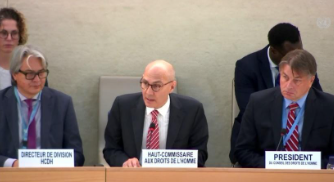 when the identity and history of a country could be denied and reality is rewritten. He explained that the UN Charter was supposed to put an end to such thinking but today Ukraine is struggling to survive the onslaught of Russia’s armed forces. The report of the Office of the High Commissioner for Human Rights (OHCHR) underlines that after 13 months of hostilities in Ukraine, severe violations of international humanitarian and human rights law have become shockingly routine resulting in people across the country experiencing massive suffering and loss. The OHCHR verified more than 8,400 civilian deaths and over 14,000 civilian injuries since February last year. However, these figures are just the tip of the iceberg. Most casualties of the conflict have resulted from the Russian force’s use of wide-impact explosive weapons in residential neighbourhoods. Moreover, in occupied areas of Ukraine, numerous cases of summary executions and targeted attacks against civilians have been committed by Russian armed forces and affiliated armed groups such as the Wagner Group.
when the identity and history of a country could be denied and reality is rewritten. He explained that the UN Charter was supposed to put an end to such thinking but today Ukraine is struggling to survive the onslaught of Russia’s armed forces. The report of the Office of the High Commissioner for Human Rights (OHCHR) underlines that after 13 months of hostilities in Ukraine, severe violations of international humanitarian and human rights law have become shockingly routine resulting in people across the country experiencing massive suffering and loss. The OHCHR verified more than 8,400 civilian deaths and over 14,000 civilian injuries since February last year. However, these figures are just the tip of the iceberg. Most casualties of the conflict have resulted from the Russian force’s use of wide-impact explosive weapons in residential neighbourhoods. Moreover, in occupied areas of Ukraine, numerous cases of summary executions and targeted attacks against civilians have been committed by Russian armed forces and affiliated armed groups such as the Wagner Group.
Additionally, the OHCHR has also documented 621 cases of enforced disappearances and arbitrary detention. Interviews with 89 civilians released from detention indicated that 91% of them were tortured or ill-treated by Russian personnel through various forms of sexual violence. 5 of the victims of enforced disappearances were boys and all were tortured or ill-treated. Of the 109 cases of sexual violence by Russian personnel that were documented most took place in places of detention. Others including rape were perpetrated in areas controlled by Russian forces mostly against women. Mr Türk added that his staff have documented 91 cases of enforced disappearances and arbitrary detention by Ukrainian security forces. Of the 73 victims interviewed, 53 per cent had been tortured or ill-treated. Furthermore, 24 cases of sexual violence by Ukrainian personnel were also documented. Most of these consisted of threats of sexual violence during the initial stages of detention as well as forced public stripping.
Ukrainian civilians have also been forcibly transferred to occupied areas of Ukraine or the Russian Federation. This includes children and adults who had been housed in social care institutions, as well as unaccompanied children living in areas of Ukraine occupied or temporarily occupied by Russian forces. The High Commissioner believes that these transfers may constitute violations of Article 49 of the Fourth Geneva Convention which prohibits forcible transfer to occupied territory or deportation to any other country regardless of their motive. More than 400 prisoners of war (POWs) on both sides have been interviewed by the OHCHR. Although Ukraine provided unfettered and confidential access to places of internment, the Russian government provided no such access despite multiple requests to do so meaning interviews with Ukrainian POWs could only take place after they had been released. Mr Türk expressed disappointment at this as it meant that several cases could not be compared against each other. Despite this, the OHCHR confirmed that more than 90 percent of Ukrainian POWs interviewed said that they had been tortured or ill-treated in penitentiary facilities. The monitoring mission in Ukraine documented the deaths of 5 POWs from injuries sustained during said torture in internment.
Although the OHCHR did not find a sustained pattern of severe ill-treatment in more permanent places of internment, the High Commissioner noted that access to food and medical care was grossly inadequate and almost half of the Russian POWs indicated that they had been tortured or ill-treated with most of these acts of torture taking place soon after their capture. He added that his office is continuing to gather and analyse information about the devastating incident in Olenvika in July 2022 in which at least 50 Ukrainian POWs were killed. In light of this, Mr Türk appealed for international monitors and staff of human rights monitoring missions in Ukraine to receive unfettered access to all individuals detained by Russian forces. Although the vast majority of these crimes have been perpetrated by Russian forces, the High Commissioner stressed that his office has documented summary executions committed by Ukrainian armed forces of Russian POWs immediately following their capture. Although Ukrainian authorities are conducting investigations into these incidents there have been no prosecutions as of yet.
Mr Türk turned the Council’s attention to the worldwide impact of the war which he claimed had sent shockwaves across the globe. He noted that sharp increases in the price of food and other essential commodities have heightened tensions and inequalities in every region. Moreover, the most severe cost of living crisis in a generation is harming the lives and livelihoods of an estimated 1.6 billion people and more than 71 million people have been pushed into poverty. The ongoing conflict in Ukraine undoubtedly threatens the stability of many countries. He stressed to the Council that it is essential to the lives of tens of millions of people around the world that the Black Sea Crane initiative continues to provide support to global food security well beyond the current cut-off point of May 2023.
The High Commissioner concluded by stating that at a time when humanity faces overwhelming existential challenges the war in Ukraine is pulling us away from the work of building solutions and ensuring our survival. He underscored the need to respect the fundamental rights of civilians and POWs and to find a peaceful solution to the conflict in line with the UN Charter and international law.
Speaker of the Country Concerned
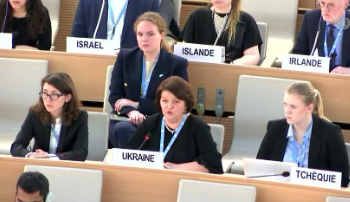 The Ukrainian representative thanked the High Commissioner for the presentation of his office’s report which she claimed provided a shocking picture of the deteriorating human rights situation in Ukraine. The delegate highlighted that the Council has received on numerous occasions undeniable evidence that the only root cause of human rights violations against the Ukrainian people since 2014 has been crimes stemming from unprovoked aggression from Russia against Ukraine. For a second year, Russia’s full-scale invasion continues to inflict unconscionable violence, destruction and unspeakable human suffering on the civilian population. The representative added that Russia’s persistent heinous attacks on residential buildings, schools, medical facilities, and political infrastructure and the deliberate targeting of civilians and civilian objects, wilful killings, torture, rape, unlawful transfers and deportations have become a hallmark of its terror against Ukraine. The delegate underscored that Russia’s brutality in its most barbaric form is manifested in the inhumane treatment of Ukrainian POWs who are subjected to torture and executions through violent beatings, electrocutions, sexual violence, or torture by fire. Although the representative notified the Council that Ukraine will continue to pursue efforts towards the establishment of a special tribunal to prosecute Russian political and military leadership for the crime of aggression, she commended the ICC for issuing arrest warrants for Vladimir Putin and Maria Alekseyevna Lvova-Belova, Commissioner for Children’s Rights in the Office of the President of the Russian Federation for the unlawful deportation and transfer of Ukrainian children from occupied territories of Ukraine to Russia.
The Ukrainian representative thanked the High Commissioner for the presentation of his office’s report which she claimed provided a shocking picture of the deteriorating human rights situation in Ukraine. The delegate highlighted that the Council has received on numerous occasions undeniable evidence that the only root cause of human rights violations against the Ukrainian people since 2014 has been crimes stemming from unprovoked aggression from Russia against Ukraine. For a second year, Russia’s full-scale invasion continues to inflict unconscionable violence, destruction and unspeakable human suffering on the civilian population. The representative added that Russia’s persistent heinous attacks on residential buildings, schools, medical facilities, and political infrastructure and the deliberate targeting of civilians and civilian objects, wilful killings, torture, rape, unlawful transfers and deportations have become a hallmark of its terror against Ukraine. The delegate underscored that Russia’s brutality in its most barbaric form is manifested in the inhumane treatment of Ukrainian POWs who are subjected to torture and executions through violent beatings, electrocutions, sexual violence, or torture by fire. Although the representative notified the Council that Ukraine will continue to pursue efforts towards the establishment of a special tribunal to prosecute Russian political and military leadership for the crime of aggression, she commended the ICC for issuing arrest warrants for Vladimir Putin and Maria Alekseyevna Lvova-Belova, Commissioner for Children’s Rights in the Office of the President of the Russian Federation for the unlawful deportation and transfer of Ukrainian children from occupied territories of Ukraine to Russia.
The Ukrainian delegation acknowledged the information provided to the Council of alleged human rights violations committed by Ukraine and is closely examining the report’s recommendations with a view to taking necessary action in line with national legislation and its international obligations. Ukraine reiterated its commitments to its obligations under IHL and IHRL and emphasised the need to engage in open and constructive cooperation with relevant international mechanisms. In line with this, the representative highlighted that established international human rights and humanitarian mechanisms continue to be denied access to Russian-occupied areas of Ukraine which prevents them from assessing the real scale of Russia’s atrocities and providing a comprehensive account of violations. The representative reiterated her demand for Russia to grant humanitarian mechanisms full and unimpeded access to the Ukrainian territories under its temporary military control so that they can fully implement their investigative mandate. Ukraine concluded by explaining that the only way to hold Russia to account and avoid further loss of life is for Ukraine to exercise its legal and moral right to self-defence under the UN charter with the support of the international community. She added that her country will leave no stone unturned in the pursuit of accountability and justice in the name of the millions of victims of Russian aggression.
Interactive Dialogue
The representative of Estonia, on behalf of the Nordic-Baltic countries, condemned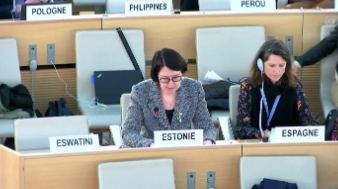 Russia’s war of aggression against Ukraine which she noted has resulted in widespread terror and intolerable suffering with far-reaching consequences. She reminded the Council that for over a year, the world has seen images and reports of indiscriminate and targeted attacks against civilians and civilian and critical energy infrastructure as well as sexual and gender-based violence. She added that children are paying a particularly high price for the current conflict with more than 400 children already being killed, hundreds more injured and seven million Ukrainian children being left without peaceful and happy childhoods having lost family and access to education. Moreover, numerous children have been systematically put through filtration camps and transferred within Ukraine and deported to Russia, where many have been separated from their parents and illegally adopted. The representative concluded by noting that forced transfers and deportation amount to war crimes and her country will continue to stand with Ukraine for as long as it takes and do everything to hold Russia fully accountable for war crimes and other violations of international law.
Russia’s war of aggression against Ukraine which she noted has resulted in widespread terror and intolerable suffering with far-reaching consequences. She reminded the Council that for over a year, the world has seen images and reports of indiscriminate and targeted attacks against civilians and civilian and critical energy infrastructure as well as sexual and gender-based violence. She added that children are paying a particularly high price for the current conflict with more than 400 children already being killed, hundreds more injured and seven million Ukrainian children being left without peaceful and happy childhoods having lost family and access to education. Moreover, numerous children have been systematically put through filtration camps and transferred within Ukraine and deported to Russia, where many have been separated from their parents and illegally adopted. The representative concluded by noting that forced transfers and deportation amount to war crimes and her country will continue to stand with Ukraine for as long as it takes and do everything to hold Russia fully accountable for war crimes and other violations of international law.
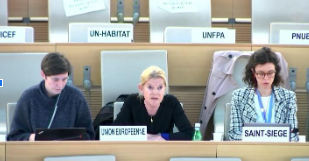 The delegation of the European Union underlined the immense regional and global suffering caused by Russia’s brutal and unprovoked attacks against Ukraine which she claimed challenged the entire rules-based international order. The EU emphasised that all victims and survivors of the war and the atrocity crimes committed on Ukrainian soil have a right to justice and reparations and the EU will continue to support all accountability efforts to achieve this. She added that the EU will continue to work with Ukraine on its 10-point peace plan and will continue to offer its unwavering support for Ukraine’s independence, sovereignty, and territorial integrity as well as its pursuit of accountability.
The delegation of the European Union underlined the immense regional and global suffering caused by Russia’s brutal and unprovoked attacks against Ukraine which she claimed challenged the entire rules-based international order. The EU emphasised that all victims and survivors of the war and the atrocity crimes committed on Ukrainian soil have a right to justice and reparations and the EU will continue to support all accountability efforts to achieve this. She added that the EU will continue to work with Ukraine on its 10-point peace plan and will continue to offer its unwavering support for Ukraine’s independence, sovereignty, and territorial integrity as well as its pursuit of accountability.
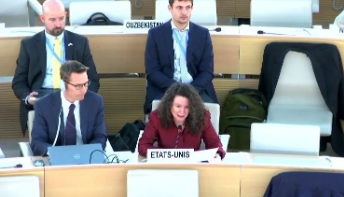 The United States of America has determined that members of Russian military forces and other Russian officials have committed crimes against humanity in Ukraine. The representative noted that Russian forces have committed executions style killings of Ukrainian men, women and children, tortured civilians in detention through beatings, electrocutions, and mock executions, committed rape and systematically deported hundreds of thousands of Ukrainian civilians to Russia including children who have been forcibly separated from their parents. The delegate stressed that these acts are not random or spontaneous but are an essential part of the Kremlin’s widespread and systematic attack against Ukraine’s civilian population. The United States condemned reports of the mistreatment of POWs and called for an end to the war and for perpetrators of rights abuses to be held accountable.
The United States of America has determined that members of Russian military forces and other Russian officials have committed crimes against humanity in Ukraine. The representative noted that Russian forces have committed executions style killings of Ukrainian men, women and children, tortured civilians in detention through beatings, electrocutions, and mock executions, committed rape and systematically deported hundreds of thousands of Ukrainian civilians to Russia including children who have been forcibly separated from their parents. The delegate stressed that these acts are not random or spontaneous but are an essential part of the Kremlin’s widespread and systematic attack against Ukraine’s civilian population. The United States condemned reports of the mistreatment of POWs and called for an end to the war and for perpetrators of rights abuses to be held accountable.
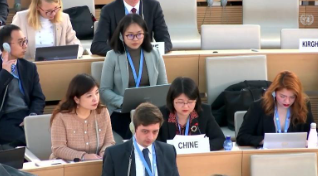 The representative of China informed the Council that her country’s position has remained consistent through the war. She reaffirmed China’s belief that the sovereignty and territorial integrity of all countries should be respected, that the principles of the UN Charter should be observed, and that the legitimate security concerns of all countries should be taken seriously. Moreover, she emphasised the need to ensure that all efforts conducive to the peaceful resolution of the crisis are supported. The delegate stressed that China is firmly opposed to politicising human rights and using them to exert pressure on other countries and any act that intensifies the conflict and exacerbates tensions in the region. She added that China is ready to work with the international community based on the document titled ‘China’s position on the political settlement of the Ukraine crisis’ and will continue to play a constructive role in promoting a political settlement of the crisis in Ukraine.
The representative of China informed the Council that her country’s position has remained consistent through the war. She reaffirmed China’s belief that the sovereignty and territorial integrity of all countries should be respected, that the principles of the UN Charter should be observed, and that the legitimate security concerns of all countries should be taken seriously. Moreover, she emphasised the need to ensure that all efforts conducive to the peaceful resolution of the crisis are supported. The delegate stressed that China is firmly opposed to politicising human rights and using them to exert pressure on other countries and any act that intensifies the conflict and exacerbates tensions in the region. She added that China is ready to work with the international community based on the document titled ‘China’s position on the political settlement of the Ukraine crisis’ and will continue to play a constructive role in promoting a political settlement of the crisis in Ukraine.
The Russian delegate claimed that the report of the OHCHR had failed to mention crimes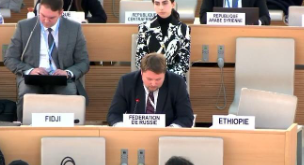 committed by the Ukrainian side during the conflict. He claimed that the authors of the report had deliberately neglected to discuss atrocities committed by Ukrainian authorities and soldiers and violations of human rights and fundamental freedoms they may have committed. The representative noted the use of sexual violence and torture by police in detention facilities and asserted that there have been 25 extrajudicial executions and 113 cases of torture of Russian POWs by Ukrainians. The delegate concluded by calling upon the HRC to react to the criminal activities of Ukraine.
committed by the Ukrainian side during the conflict. He claimed that the authors of the report had deliberately neglected to discuss atrocities committed by Ukrainian authorities and soldiers and violations of human rights and fundamental freedoms they may have committed. The representative noted the use of sexual violence and torture by police in detention facilities and asserted that there have been 25 extrajudicial executions and 113 cases of torture of Russian POWs by Ukrainians. The delegate concluded by calling upon the HRC to react to the criminal activities of Ukraine.
NGOs and National Human Rights Institutions
NGOs commended the work of the OHCHR and the report it has compiled which many claimed highlighted the horrifying impact Russia’s invasion of Ukraine has had on the human rights of civilians and soldiers alike. Many speakers welcomed the news by the Ukrainian representative that accusations of war crimes by Ukraine are currently being investigated and accused Russia of violating the Geneva Convention and IHRL and IHL. A particular emphasis was placed on the mistreatment of POWs and the need to ensure they can avail of effective medical treatment and proper detention facilities. Several speakers praised the decision of the ICC to issue arrest warrants for Vladimir Putin and Maria Alekseyevna Lvova-Belova which they stressed should be part of a wider effort to ensure accountability for those who have perpetrated human rights abuses.
Geneva International Centre for Justice (GICJ) in a joint statement with the Meezan Centre for Human Rights, thanked the High Commissioner for his report and urged the international community to continue to speak out against Russia’s actions in Ukraine. The statement implored all members of the HRC to engage in immediate collective efforts to stop the war and provide support to victims of the conflict. Moreover, the statement stressed the need for Russia and Ukraine to negotiate a plan to bring the war to a peaceful settlement to avoid further loss of life.
Concluding Remarks
The High Commissioner brought the meeting to a close by answering several questions posed by member states about certain topics of his office’s report. Regarding questions about the forced deportation of children, Mr Türk informed the Council that the mission on the ground is still documenting allegations of the forced transfer of children, however, the lack of access to the Russian Federation and occupied territories makes it difficult to assess the full extent of deportation levels. He appealed to the Russian Federation to share information about children that were displaced from Ukraine and ensure that family reunification is facilitated by establishing a functioning mechanism to identify these children and trace family links. Moreover, he reminded parties to the conflict to respect IHL and IHRL and fully adhere to the prohibition of changing the personal status of children transferred from Ukraine and to ensure no adoptions of children separated from their parents take place during or immediately after the armed conflict.
Concerning the treatment of POWs, the High Commissioner stressed that very clear norms are contained within IHL and IHRL which stipulate how they must be treated when held in detention facilities. He added that it is important to ensure that all wounded soldiers and POWs are returned and repatriated.
Mr Türk acknowledged the importance of ensuring that victims of the war are properly taken care of and can avail of reparations. He appealed to the international community to help Ukraine expand its social housing options for displaced persons but reminded the Council that efforts to adequately compensate victims of the conflict will require more support from the donor community to make sure existing schemes are supported.
The High Commissioner also highlighted the need to deal with global food insecurity issues. He noted that the current conflict has precipitated the most severe global cost of living crisis in a generation. Resultantly, the international community has seen decades-long efforts in human development and programmes to eradicate hunger and malnutrition put at severe risk as well as improvements in health and living standards.
Position of Geneva International Centre for Justice
Geneva International Centre for Justice (GICJ) commends the work of the OHCHR in documenting war crimes in Ukraine stemming from Russia’s unprovoked war of aggression against Ukraine. Currently, nearly 18 million people in Ukraine are in need of humanitarian assistance and the conflict has undermined a myriad of human rights. The increasing levels of deprivation, displacement, destruction, and the continuing worldwide effects of this conflict, including on countries without any involvement, are becoming even more pronounced as the war lingers on. Member states must increase their efforts to provide humanitarian assistance to those impacted by the war and ensure that Ukraine’s sovereignty and territorial integrity remain intact.
Although members of the Russian armed forces and affiliated armed groups bear most of the responsibility for perpetuating severe human rights abuses, GICJ is concerned about reports of possible war crimes committed by Ukrainian forces. While there are disparities in the scope and scale of rights abuses being committed by the parties to the conflict it is imperative that both sides demonstrate respect for the principles of IHL and IHRL. Although Ukrainian soldiers and civilians are being forced to endure egregious human rights violations, war crimes and possibly crimes against humanity, it is essential it does not undermine the values it is defending.
Joint statement by GICJ
Delivered by Bethany Morley
Regular_Session, Justice, Human_Rights, Geneva, Geneva4justice, GICJ Geneva_International_Centre_for_Justice, HRC52, Ukraine, Russia, Interactive_Dialogue War_Crimes












